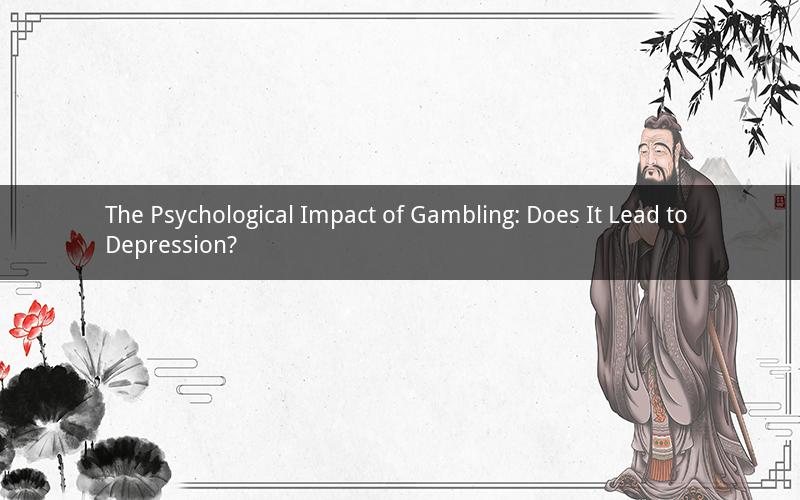
Gambling has been a prevalent form of entertainment for centuries, captivating millions of people worldwide. However, it is essential to recognize that gambling can have severe psychological consequences, including depression. This article delves into the relationship between gambling and depression, exploring the potential causes, symptoms, and coping strategies.
I. The Link Between Gambling and Depression
A. The Psychological Effects of Gambling
Gambling can trigger a range of psychological effects, both positive and negative. While the thrill of winning can provide a temporary sense of elation, the fear of losing can lead to anxiety and stress. Over time, these negative emotions can contribute to the development of depression.
B. The Role of Dopamine in Gambling
The brain's reward system is activated when a person wins at gambling, releasing dopamine—a neurotransmitter associated with pleasure and satisfaction. However, this reward system can become overstimulated, leading to a reliance on gambling as a means of obtaining pleasure. This reliance can exacerbate feelings of sadness and hopelessness, potentially leading to depression.
II. Causes of Depression in Gamblers
A. Financial Strain
One of the primary causes of depression in gamblers is financial strain. The desire to win back lost money can lead to excessive gambling, resulting in significant debt and financial hardship. This financial stress can contribute to feelings of despair and hopelessness, increasing the risk of depression.
B. Social Isolation
Gambling can also lead to social isolation, as individuals may prioritize their gambling activities over personal relationships. This isolation can exacerbate feelings of loneliness and sadness, further contributing to the development of depression.
C. Psychological Factors
Certain psychological factors can make individuals more susceptible to depression as a result of gambling. These factors include low self-esteem, a history of trauma, and a tendency towards addictive behaviors.
III. Symptoms of Depression in Gamblers
A. Emotional Symptoms
Gamblers experiencing depression may exhibit a range of emotional symptoms, such as sadness, irritability, and feelings of hopelessness. They may also experience a loss of interest in activities they once enjoyed and have difficulty experiencing pleasure.
B. Cognitive Symptoms
Cognitive symptoms of depression in gamblers may include difficulty concentrating, memory problems, and feelings of worthlessness. These symptoms can make it challenging for individuals to maintain their daily responsibilities and relationships.
C. Physical Symptoms
Physical symptoms of depression in gamblers may include fatigue, insomnia, and changes in appetite. These symptoms can further contribute to the overall sense of distress and well-being.
IV. Coping Strategies for Gamblers with Depression
A. Seeking Professional Help
The first step in addressing depression in gamblers is to seek professional help. A mental health professional can provide therapy, medication, and support to help individuals manage their depression and gambling addiction.
B. Building a Support System
Creating a support system is crucial for individuals struggling with gambling and depression. This support system can include friends, family, and support groups focused on gambling addiction and mental health.
C. Developing Healthy Coping Mechanisms
Gamblers with depression should focus on developing healthy coping mechanisms to replace gambling as a means of dealing with stress and emotions. This may include exercise, hobbies, and mindfulness practices.
V. Conclusion
Gambling can have a profound impact on an individual's mental health, potentially leading to depression. Recognizing the signs of depression and seeking appropriate treatment is essential for individuals struggling with gambling addiction. By understanding the link between gambling and depression, individuals can take steps to improve their mental health and break the cycle of addiction.
Questions and Answers:
1. What are the primary psychological effects of gambling?
Gambling can trigger a range of psychological effects, including pleasure, anxiety, and stress. These effects can contribute to the development of depression over time.
2. How does the brain's reward system contribute to depression in gamblers?
The brain's reward system releases dopamine when a person wins at gambling, which can lead to a reliance on gambling as a means of obtaining pleasure. This reliance can exacerbate feelings of sadness and hopelessness, potentially leading to depression.
3. What are some causes of depression in gamblers?
Causes of depression in gamblers include financial strain, social isolation, and psychological factors such as low self-esteem and a history of trauma.
4. What are the symptoms of depression in gamblers?
Symptoms of depression in gamblers may include emotional symptoms (sadness, irritability), cognitive symptoms (difficulty concentrating, memory problems), and physical symptoms (fatigue, insomnia).
5. What are some coping strategies for gamblers with depression?
Coping strategies for gamblers with depression include seeking professional help, building a support system, and developing healthy coping mechanisms such as exercise, hobbies, and mindfulness practices.